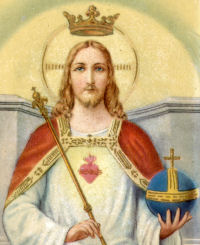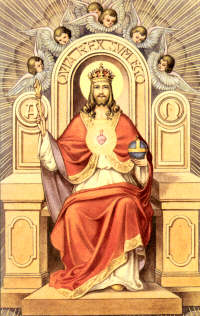When the Son of Man comes in his glory … (Matthew 25:31)
Today is the last Sunday in the church year. So it’s appropriate to reflect on the end of time, on judgment, and on the life to come. These topics can fill us with a number of positive thoughts and a few fearful ones. In our anxious moments, we may worry about whether we or our loved ones will get into heaven. We may worry about death itself or what we will actually be doing for all eternity in heaven.
In our more positive moments, we are probably filled with hope and expectation. We trust that the Second Coming will be great. We can’t wait to live in a place where there are no wars, poverty, or sickness. We believe that heaven is a far better place than this world, and we greatly look forward to a life filled with peace and happiness.
Thinking about the Second Coming can also help remind us of a key truth of our faith: We cannot save ourselves. Only Jesus can do that —and he did, when he died on the cross for us. But isn’t it ironic that while we cannot save ourselves, God will still judge us based on how we have loved one another and cared for the poor and needy around us? How is that possible?
The truth is, our acts of love and charity should be a direct consequence of our realization that Jesus, our King, loves us. The experience of Jesus’ love should send us to our knees in worship, and it should send us out into the world, eager to spread that love to everyone we come in contact with —our loved ones, the needy, and even our enemies.
So as we contemplate our loving, merciful King today, let’s ask him to inspire us to serve his kingdom. And whenever we perform acts of charity, let’s see them as a way that we can give our hearts back to Jesus, who gave himself for us.
“Jesus, give me a generous heart. Teach me how to open my heart — and my hands —to everyone around me.”
Questions for Reflection or Group Discussion
(Ezekiel 34:11-12,15-17; Psalm 23:1-3,5-6; 1 Corinthians 15:20-26,28; Matthew 25:31-46)
1. In the first reading, God describes himself as a shepherd watching over us, his flock. He also promises to rescue the scattered, seek the lost, bring back the strayed, bind up the injured, and heal the sick. While less and less of us today can relate to this pastoral metaphor, we can nevertheless still be touched by the degree of care expressed by God toward us. As a Catholic man or woman, how has God called you to be a “shepherd,” e.g., in your family, in serving others, in a church ministry, etc.? How would you describe your role? In what way is it to mirror God’s care for you?
2. The responsorial psalm continues the metaphor of the “Lord is my shepherd” and once again describes his great care for his sheep. Since we as Catholics are one of the sheep being described, how faithful are you in allowing Jesus to guide you in “right paths”? What needs to change?
3. In the second reading, St. Paul describes Christ as risen and reigning. What specific steps could you take to increase the risen Christ’s reign in your heart, in your family, or where you work?
4. In the Gospel, Christ lets us know exactly the things that are important to him at his second coming. Of course, we all want to be the sheep on his right and not the goats on his left. We all want to hear these words from Jesus, “Come, you who are blessed by my Father. Inherit the kingdom prepared for you from the foundation of the world.” Which two of the actions that he describes for the sheep on his right are you willing to commit to in the upcoming weeks, and perhaps as Advent and Christmas promises?
5. In the meditation, we hear these words: “The truth is, our acts of love and charity should be a direct consequence of our realization that Jesus, our King, loves us. The experience of Jesus’ love should send us to our knees in worship, and it should send us out into the world, eager to spread that love to everyone we come in contact with—our loved ones, the needy, and even our enemies.” St. Paul says that “the love of Christ impels us, once we have come to the conviction that one died for all; therefore, all have died” (2 Corinthians 5:14). To what extent does your experience of Christ’s love “impel” you to reach out to others less fortunate than you? What steps can you take to open yourself up to a deeper experience of Christ’s love?
6. Take some time now to pray for a generous heart that desires to serve the Lord and to be his instrument in serving others. Use the prayer at the end of the meditation as the starting point.

 The liturgy is an album in which every epoch of Church history immortalizes itself. Therein, accordingly, can be found the various pictures of Christ beloved during succeeding centuries. In its pages we see pictures of Jesus suffering and in agony; we see pictures of His Sacred Heart; yet these pictures are not proper to the nature of the liturgy as such; they resemble baroque altars in a gothic church. Classic liturgy knows but one Christ: the King, radiant, majestic, and divine.
The liturgy is an album in which every epoch of Church history immortalizes itself. Therein, accordingly, can be found the various pictures of Christ beloved during succeeding centuries. In its pages we see pictures of Jesus suffering and in agony; we see pictures of His Sacred Heart; yet these pictures are not proper to the nature of the liturgy as such; they resemble baroque altars in a gothic church. Classic liturgy knows but one Christ: the King, radiant, majestic, and divine.